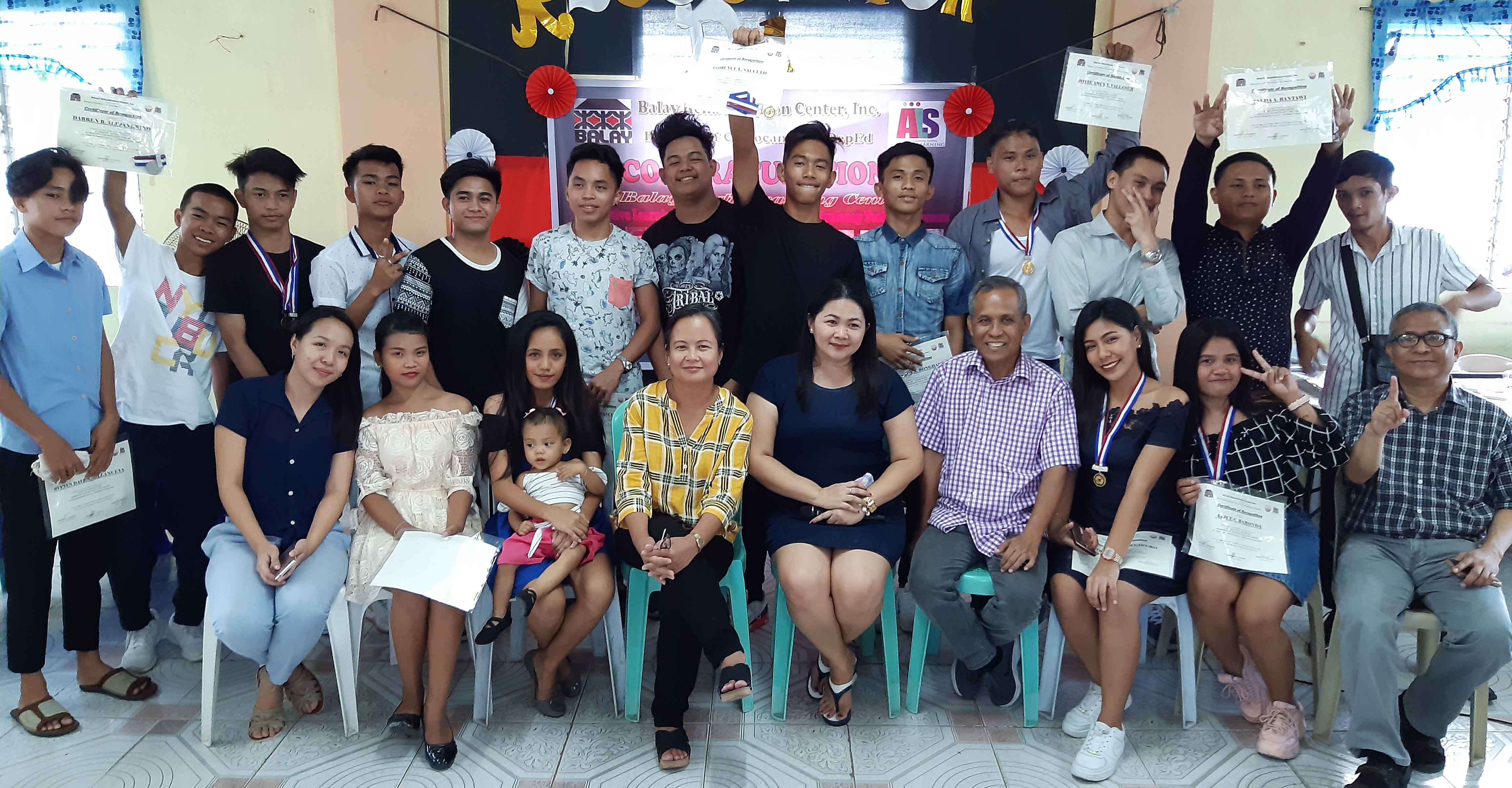Balay celebrates graduation of ALS Learners in Bagong Silang

Balay Rehabilitation Center has given recognition to 26 learners in its Alternative Learning Center for passing the accreditation and equivalency exam administered by the Department of Education to students who completed the Alternative Learning System (ALS) Program. The passers represent 37% of the total learners currently enrolled in the Balay ALS program. The ceremony was held at the Balay - Alternative Learning Center in Phase 7 last October 24, 2019.
According to Balay Executive Director Josephine Lascano, the organization started its program in Bagong Silang in 2010 with the goal of reducing and preventing the exposure of children and youth at risk to violence particularly police related violence and organized crime prevalent in urban poor communities.
Among the graduates, thirty percent will move up to college, while the rest will either continue their education in the formal school system or get some technical education or seek better employment opportunities.
Bagong Silang is a relocation site in Metro Manila considered as one of the largest barangay in the Philippines with over 246,000 population. Wallowing in a state of socio-economic stagnation, it is mired in a youth bulge whose developmental options are restricted by poverty and a social environment that is ridden with violent pathways. This is an observation that even elected community leaders do not contest. With socio-economic levels below the national poverty line and unemployment rates between 45 % and 65 %, poverty has been a widely recognized driver of community violence in Bagong Silang.
For out of school youths, the time and the place where they hang around, and the kind of activities they engage are factors that affect their safety and security as well as their productive potential. Trying to get away from their impoverished and oftentimes discordant households, many young people are attracted to spend more time in the street or join their peers and engage in unproductive and, oftentimes, harmful activities. Once they earned a reputation as misfits or menace, their social capital dips further making them easy prey of authorities who consider them as ‘usual suspects’ whenever trouble erupts in their community. Unless they get out of that precarious social situation, their chances of finding good jobs become dimmer which, in turn, increases the likelihood that they will remain in a state of developmental stagnation as they were before.
The Alternative Learning System (ALS) is designed to give opportunities to out of school youth to redeem their sense of dignity and self-worth through a modular kind of education that is suited for those who have no means to continue their formal schooling and to increase their chances of finding meaningful and gainful work. Through the ALS, Balay offers the learners a ‘developmental space’ where they can participate in alternative classes, learn skills for productive undertaking, and enhance their creative abilities. Moreover, the learning center also serves as a ‘social space’ where the young people can congregate, learn together, talk about their problems, seek support and find a common solution with each other. lt is a place where the youth can seek comfort and protection; and to have fun as they establish their identity as effective participants in community life.
As an ‘emotional space’ the learning center los offers a place where Balay counselors and the young people can have a supportive interaction to address the psychosocial issues.
Lascano said, “Aside from the traditional lesson given to the learners, Instructional Managers (IMs) of Balay-ALS also engage learners to Leadership and Human Rights awareness-raising workshops and trainings which will help them understand and appreciate their rights.”
Learners expressed their gratitude noting that the program helped them feel productive which eventually prevented them in participating in an at-risk behavior. The program also greatly contributed in building their confidence to help them attain their goals and provides them an opportunity to get a reliable employment.
“Due to their impoverished condition, some of our learners were previously involved in habitual offenses and were exposed to police violence. The Balay-ALS program serves as an avenue to divert their attention. They were able to learn and engage with children and youth of their age. The ALS graduation is emblematic as it highlights the achievements of these children, that they can dream and hope for a better future again.” Lascano ended
